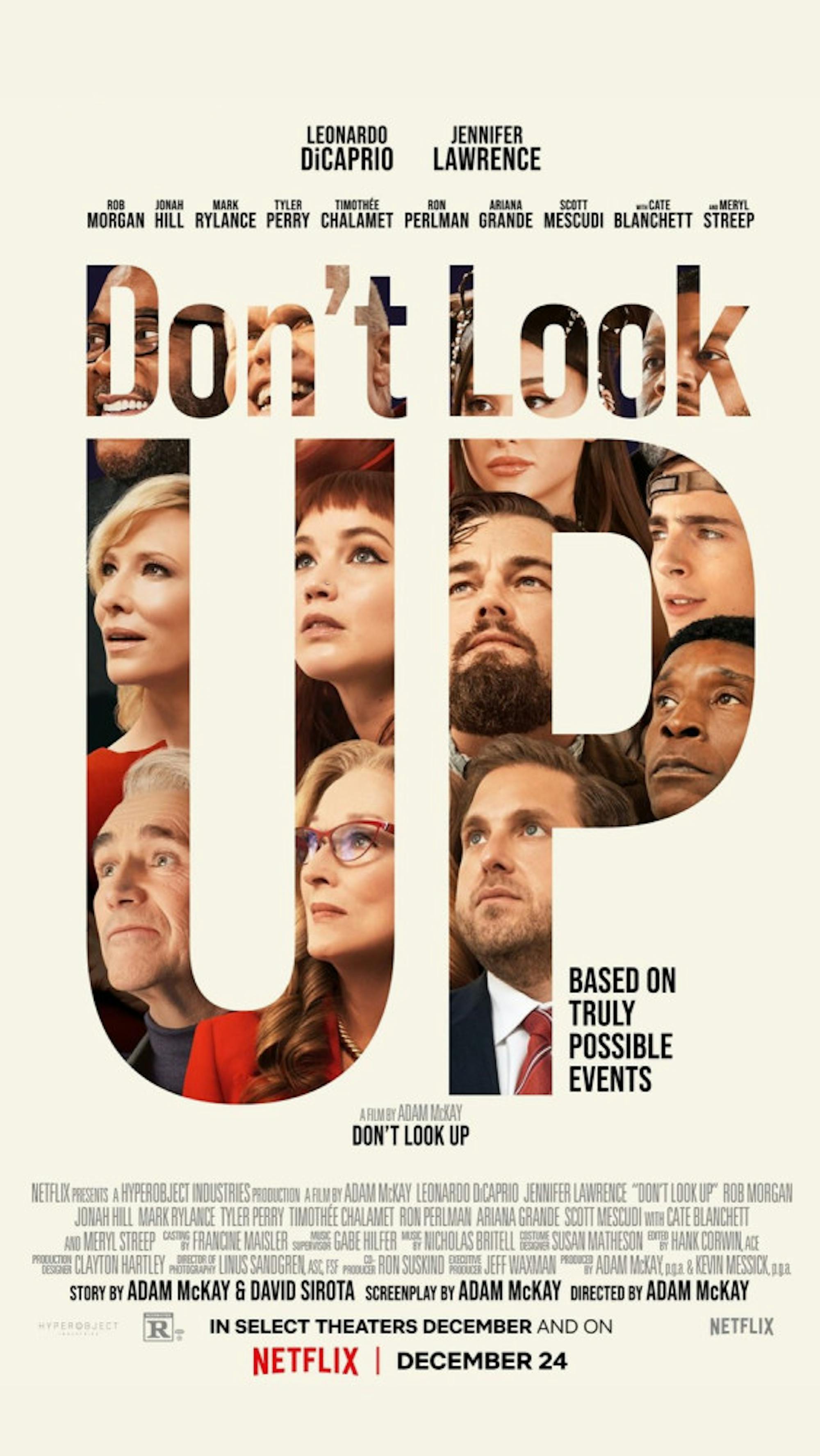Adam McKay has now formed a brand for himself as a political filmmaker, whether it be with his standout “The Big Short” (2015) about the 2007–2008 financial crisis or his follow-up “Vice” (2018) about the political career of Dick Cheney. With even more glitz and stars, McKay returns to the scene with his new big-budget film“Don’t Look Up” (2021). The film tackles the issue of climate change at large, using the allegory of a large comet hurtling towards the earth. With such a broad scope, McKay works to satirize almost every element of our present political and social condition. Though often funny and sometimes even jaw-dropping, the film ultimately comes off as deeply ostentatious, failing to effectively inspire any desire to fix our own political issues.
The film follows Dr. Randall Mindy (Leonardo DiCaprio) and Kate Dibiasky (Jennifer Lawrence), two scientists who discover an incoming comet that would destroy all life on earth. The two bring their findings to President Janie Orlean (Meryl Streep), a political hack who first ignores the comet’s existence and then uses it to up her reelection chances. Later, however, she changes her stance when tech giant Peter Isherwell (Mark Rylance) notifies her of rare elements in the comet that could be profitable. What ensues is an over two-hour political farce, mocking everything from news media to big business to the incompetence of nepotistic leaders.
This broad scope is ultimately the film’s downfall. In tackling climate change at large and every individual sociopolitical issue within the fight for environmental stability, the film simply takes on too much. At best, this scope leads to a disorganized and messy film without clarity of purpose. At worst, it leads to a massive oversimplification of deeply important social issues. Take, for example, the film’s treatment of broadcast journalism. In the “Don’t Look Up” universe there is only one significant news show, which is "The Daily Rip," hosted by Brie Evantee (Cate Blanchett) and Jack Bremmer (Tyler Perry). These hosts are portrayed as being far too wrapped up in celebrity culture, as they sideline the comet discovery and focus on the relationship of stars Riley Bina (Ariana Grande) and DJ Chello (Kid Cudi). The message is clear: Our news ecosystem focuses far too much on celebrity gossip and not enough on the pressing issues. But is it really celebrity culture that causes the news to ignore climate change? What about the other blatant issues in modern journalism, like misinformation or political partisanship, which may have further significance in our environmental failures? In attempting to simplify the issues of modern media for a quick laugh, the film gives less attention to its more serious aspects.
Further, in its deeply satirical tone, the film reeks of pretension. A deep binary exists between the messaging of the film and the lives of its creators. The film tackles an issue that most dramatically impacts poor people and which is most significantly caused by the wealthy. The relative wealth of those who created and acted in the film leads it to come across as a massive project of virtue signaling. At the end of the day, Adam McKay will be able to make yet another multimillion-dollar movie, and Leonardo DiCaprio will be able to go back to riding in megayachts. Thus, the issue of perspective plagues the narrative. Take, for example, when Dibiaskygoes home to her parents’ house. Her parents don’t let her inside, saying that they are for the jobs that the comet can create. The moment is played for a quick laugh: What fools would support a life-ending comet? However, it’s deeply cruel for multimillionaire directors and actors to make jokes mocking characters with less individual wealth for wanting to increase jobs.
The film does, however, have a sheer enjoyability factor for which it must be praised. The all-star cast is constantly eye-popping, making the film shinier and more marketable. There are also some incredibly campy moments that are pure fun, whether it be a midfilm Ariana Grande performance or a post-credit scene with alien birds. In this way, it’s difficult to term the film as good or bad. The film was surely enjoyable but failed at what it so blatantly determined to be its mission. Thus, maybe it’s more helpful to describe the film as being successful or not.
Ultimately, “Don’t Look Up” is a success as a purely fun film and a failure as a political commentary. If one can look past the messaging and simply zero in on the plot, they’re in for a joyous ride. However, the film is so obtuse in its political imagery that it’s hard to ignore. When engaging in the broader political context of the film, it comes off as entirely oversimplified and pretentious in nature.






